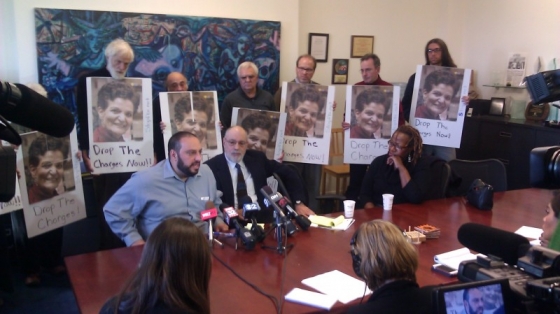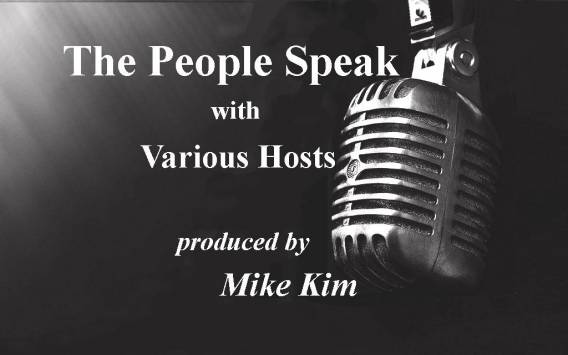The People Speak

The People Speak has evolved over the years with many great guests who have been interviewed by some very fine hosts.
We are a 55 minute show airing every other Sunday between 5-6pm Pacific/8-9pm Eastern. The show features a guest interview from any number of realms of interest (entertainment, science, philosophy, healing, spirituality, activism, politics, literature, etc.).
The guests share their stories, lives, strategies, books, philosophy, films, music, or whatever it is they use as a vehicle for making a difference for the better.
The radio show name, The People Speak, is based on the idea of allowing our audience - the People - a chance to interact with the guests during the hour, and we take phone or text questions from them during the interview.
Past guests include such notables as Nobel Peace Laureate Archbishop Desmond Tutu, the late Howard Zinn, Nobel Laureates Mairead Maguire, Shirin Ebadi, Kathryn Najimy, Oliver Stone, Jesse Ventura, Richard Belzer, Cynthia McKinney, Cindy Sheehan, Scott Horton, Joan Jett, Willie Nelson, George Galloway, Roseanne Barr, Ed Asner, Chevy Chase, as well as various reps from Amnesty International, UN World Food Programme, and many others.
Guest, Hatem Abudayyeh

Hatem Abudayyeh
Executive Director
Hatem Abudayyeh has been with the Arab American Action Network (AAAN) since 1999, and was appointed Executive Director in 2003. The son of Palestinian immigrants who themselves were leaders in Chicago’s Arab community, Hatem was born in Chicago and coached varsity basketball and baseball as an administrative assistant at Mather High School before joining AAAN. He was elected Vice President of the Board of Directors of the Coalition of African, Arab, Asian, European, and Latino Immigrants of Illinois (CAAAELII) in 2006, is a founding Advisory Board member of the National Network for Arab American Communities (NNAAC), and sits on the National Coordinating Committee of the United States Palestine Community Network (USPCN).
Hatem speaking at Press Conference on Palestinian Activist Rasmea Odeh
https://www.youtube.com/watch?v=vVciKRYfKWY
The Case of Rasmea Odeh: A Palestinian Hero
 Rasmea Odeh
Rasmea Odeh
Rasmea Odeh is a leading member of Chicago’s Palestinian, Arab, and Muslim communities, and her decade of service in Chicago has changed the lives of thousands of people, particularly disenfranchised Arab women and their families. She has been with the Arab American Action Network (AAAN) since 2004, and is responsible for the management of day-to-day operations and the coordination of its Arab Women’s Committee, which has a membership of nearly 600 and leads the organization’s work in the areas of defending civil liberties and immigrants’ rights. She is a mentor to hundreds of immigrant women, as well as many members of the AAAN’s staff and board, and is a well-known and respected organizer throughout Chicagoland, the U.S. and the world.
In 2013, Rasmea received the Outstanding Community Leader Award from the Chicago Cultural Alliance, which described her as a woman who has “dedicated over 40 years of her life to the empowerment of Arab women, first in her homes of Palestine, Jordan and Lebanon, where she was an activist and practicing attorney, and then the past 10 years in Chicago.”
Rasmea is a community icon who overcame vicious torture by Israeli authorities while imprisoned in Palestine in the 1970s, and an example for the millions of Palestinians who have not given up organizing for their rights of liberation, equality, and return.
The prosecution of a hero
In the early morning of Tuesday, October 22, 2013, then sixty-six year old Rasmea Odeh was arrested at her home by agents from the Department of Homeland Security. She was indicted in federal court, charged with Unlawful Procurement of Naturalization, an allegation based on answers she gave on a 20-year-old immigration application. Rasmea, her supporters, and her legal team say that the immigration charge was nothing but a pretext to attack this icon of the Palestine liberation movement.
The government claims that Rasmea failed to disclose that she was convicted by the Israelis of participating in bombings in 1969. This conviction in a military court was the result of a false confession made after she was viciously tortured and raped by Israeli military authorities for weeks. There is no due process in Israeli military courts, which “convict” over 99% of Palestinians who come before them, and “evidence” from these should not be accepted in a court in the U.S.
Despite this, Rasmea’s case on immigration charges went to trial in Detroit in November 2014.
There, Federal Judge Gershwin Drain allowed the Israeli military court conviction to be entered into evidence, but barred testimony about her torture at the hands of her Israeli captors. That ruling eliminated the testimony of expert witness Dr. Mary Fabri, a clinical psychologist who has decades of experience working with torture survivors. Fabri was prepared to testify that the allegedly false answers on the immigration forms were the result of Rasmea’s chronic Post-Traumatic Stress Disorder (PTSD).
Rasmea never set out to hide her past. She had testified about her torture at the United Nations when she was released in 1979. As her lead attorney, Michael Deutsch, said, “It was well known that she was convicted, and traded [in a prisoner exchange]. The U.S. Embassy knew it, the State Department knew it, and Immigration should have known it.”
Never really about immigration, the case against Rasmea grew out of the investigation of 23 anti-war and Palestinian community organizers in Chicago and Minneapolis, who were subpoenaed to a federal grand jury in 2010. Make no mistake. Rasmea came under attack by the U.S. government because she is Palestinian, and because for decades, she has organized for Palestinian liberation and self-determination, the Right of Return, and an end to Israeli occupation and colonization. Palestine support work, especially the Boycott Divestment Sanctions (BDS) movement, has made a number of recent gains, and the long arm of federal law enforcement has attempted to crack down on it, like it has on all effective and impactful movements for social justice in the history of this country. Rasmea’s prosecution is part of this crackdown.
 Rasmea and Supporters
Rasmea and Supporters
The fight for justice
During her November trial, Rasmea and her defense team put the crimes of Israel on record. Her story of being exiled from the village of her birth, Lifta, in 1948; of being exiled again during the 1967 war; of experiencing the death of her sister after the raid on her home in 1969; and of being a political prisoner, one of the most famous in the history of the Palestine liberation movement—all these are stories of the crimes of apartheid Israel, crimes that continue today in the racist settler and military assaults we have seen in the Gaza Strip, Jerusalem, 1948 Palestine, and the West Bank. Israel’s terrorism, and the U.S. government’s complicity, were exposed for all the world to see.
Rasmea’s case is not only about the U.S. carrying out Israel’s agenda, but also connected to racist policies here. The civil rights of Arabs and Muslims are violated with impunity, particularly those who are critical of U.S. support for Israel’s crimes against the Palestinian people. This is in the context of the long history of attacks against communities that organize for social change in this country, especially Black, Chicano and Mexicano, Puerto Rican, Native, Asian, and other oppressed nationalities.
Rasmea was convicted in the unjust trial in November, and imprisoned in a Michigan county jail for a month, under very difficult conditions, including almost three weeks in solitary confinement. Supporters across the country rallied for – and won – her release on bond.
In March 2015, Rasmea was sentenced to 18 months in prison and subsequent deportation. However, because of our organizing efforts, she is staying free on bond pending appeal. The sentence was a huge blow to the prosecutor, who asked for 5-7 years. Her appeal was filed by defense attorneys on June 9, the prosecution replied on July 8, and the defense rebuttal was sent to the U.S. Court of Appeals for the Sixth Circuit on July 20. The appeals court heard oral arguments in Cincinnati on Wednesday, October 14, and Deutsch made a powerful argument for Rasmea deserving a new trial. We will get a decision 1-4 months from now, but the fight is far from over, and we still need your support to ensure that we win #Justice4Rasmea.










